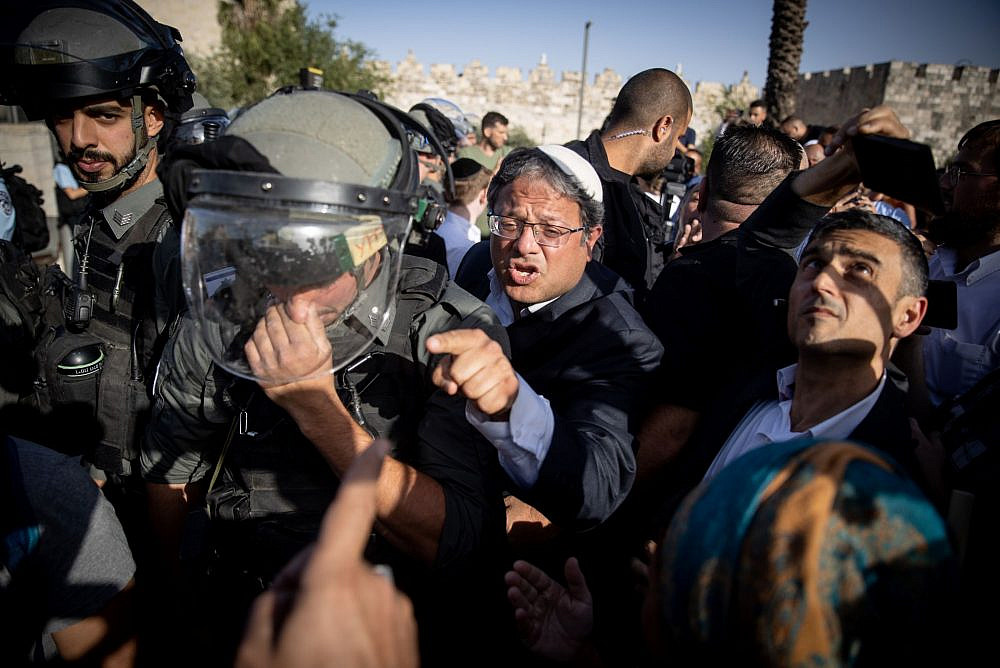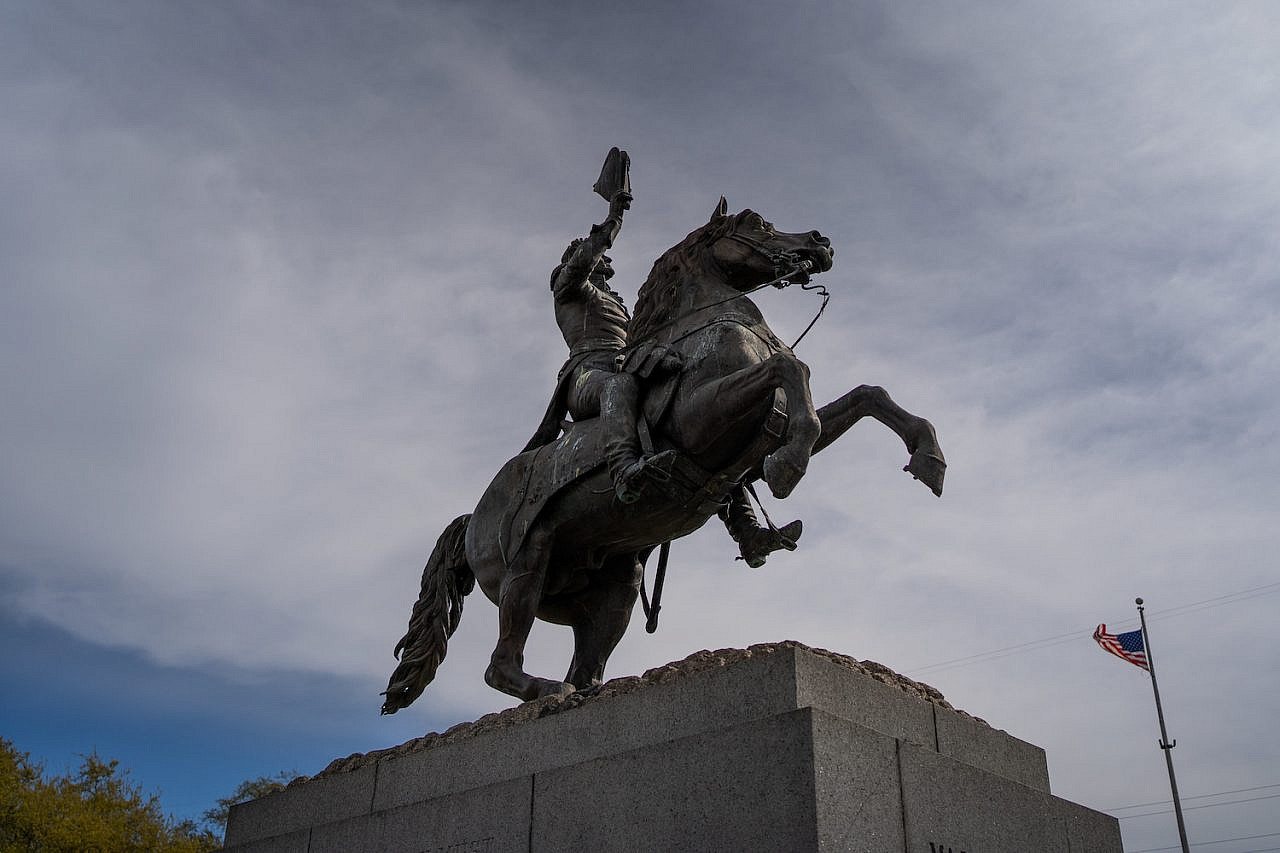On Nov. 1, as the exit polls from the Israeli election were being released, I switched the television channel over to Kan, Israel’s Public Broadcasting Corporation. After airing Itamar Ben Gvir’s victory speech — his far-right Religious Zionism slate won 14 seats, making it the third largest in the new Knesset — the studio panel began discussing the reasons for his astronomical rise.
Until just a few years ago, Ben Gvir, who is head of the Otzma Yehudit (Jewish Power) faction in Religious Zionism, was considered a fringe extremist. But now, he represents a significant portion of the Jewish-Israeli public, and is set to serve as Israel’s “national security minister” with an expanded portfolio that will include responsibility for the Border Police — a military unit made up of 2,000 soldiers whose duties are policing Palestinians in the occupied territories, carrying out arrests, and evacuating settlement outposts, which until now was under the authority of the Israeli army.
Ben Gvir’s success relied, in part, on driving voter turnout particularly in the cities of southern Israel, whose residents are largely working- and middle-class Mizrahim (Jews that immigrated to Israel from Arab or Muslim countries), who have historically leaned toward the Sephardic Haredi party Shas and Benjamin Netanyahu’s Likud.
The panelists claimed, rightfully, that those new Ben Gvir voters came out in droves to secure his promise of personal safety and meshilut — a Hebrew word meaning “governance,” which has become a buzzword on the right to denote the need to crack down on what Ben Gvir has described as “internal terrorism” by Palestinian citizens of Israel against Jews, above all in the Negev/Naqab and the historically Palestinian urban centers known in Israeli parlance as “mixed cities.” For Ben Gvir, the unruly natives must be put back in their place using the full force of the state apparatus because, as his ubiquitous campaign slogan asked rhetorically, “Who here is the lord of the land?”

Ben Gvir’s ability to capture a social, class, ethnic, and geographic issue and tether it to a racist worldview draws directly from his teacher and mentor, Meir Kahane. In 1984, Kahane’s successful campaign to be elected to Knesset as head of the Kach party focused on the rhetoric of “Jewish labor,” eliciting support from working-class Mizrahi voters who had been harmed financially by the influx of Palestinians from the occupied territories into the Israeli labor market after 1967.
What Kahane and Ben Gvir both successfully tapped into is the discrimination and marginalization that Mizrahim have experienced for decades at the hands of the state’s Ashkenazi-Zionist establishment, which has produced an ethnic underclass within Jewish-Israeli society. The historical alignment between the Ashkenazi upper- and middle-class and Israel’s Zionist-left or centrist parties has, in turn, generated a long-standing affinity between Mizrahim and right-wing parties, which began with the “upheaval” election of 1977 that saw the nationalist Likud seize power for the first time, and was strengthened ever since Netanyahu’s first return to power in 2009. And while the colonial spoils of 1948 were enjoyed mostly by Ashkenazim, the establishment of settlements on the plunder of Palestinian land in the occupied territories since 1967, alongside the neoliberalization of the Israeli economy since the 1980s, has enabled Mizrahim and other marginalized Jewish-Israeli groups to gain more of a foothold.
Among the panelists on Kan’s election-night program, nobody pushed back against Ben Gvir’s framework for understanding meshilut. Every single person seemed to agree with it — they were simply uneasy about his lack of respectability and open calls for violence. Not one panelist presented an alternative framework for understanding how his far-right party surged to become the third largest in the country. Not a single person pointed out the brutal nature of Israeli state violence and how it creates brutal conditions among its most dispossessed citizens, nor presented any ideas for how to change this situation.

The discussion was, in essence, yet another expression of the empty politics that defines the “anyone but Bibi” bloc, which was embodied by the outgoing “government of change” led by Naftali Bennett and Yair Lapid. Respectability politics have been this bloc’s guiding principle over the past two years. They want their violence dressed in a suit and tie: respectable violence by respectable leaders, not — God forbid — the extremism of a brute who does not hesitate to pull out his gun on Palestinians in Sheikh Jarrah.
Respectability politics is, at its core, the politics of a bourgeois aristocracy. It is afraid of speaking to the public, or of representing a popular grassroots movement. It is, in fact, the complete opposite of left-wing politics. However, in this context, it is easy to see how the rise of a figure such as Ben Gvir, and the issues he raises, are directly connected to the fact that Jewish society in Israel is a settler society. It is also evidence of how the ascending social position of sub-groups who were once blocked from power occurs simultaneously with the deepening of colonial control.
American spoils
American historiography refers to the period following Andrew Jackson’s 1828 presidential victory as “the era of the common man,” marking a turning point in the balance of power within American white settler society. Prior to Jackson’s rise, the levers of power were pulled by figures who came from the older, privileged segment of that society. This group mostly lived in large cities in the northeastern regions of the United States, yet the population it represented was decreasing in numbers.
Meanwhile, the United States saw the rise of new social groups — such as young farmers and immigrants from Europe who settled in the Western regions, in the so-called “American frontier” — who demanded a seat at the table. They advocated a policy of unlimited expansion, which did not recognize the alliances made and treaties signed with the Native Americans, and demanded that the federal government support their takeover of more native land using force and capital. In other words, the younger settler groups — who did not belong to the old guard that had already established itself on conquered lands — wanted to continue colonization to serve their own interests.
The rise to power of Jackson — a Tennessee farmer who was considered a self-made man and the embodiment of the American entrepreneur — was seen as an expression of “democratization” and a victory for the masses against the aristocratic establishment. This image was, of course, a product of the narrow confines of white American settler society, while “the people” that Jackson claimed to represent, being part of that society, felt entitled to the spoils and privileges that derived from dispossessing the native population.
Indeed, Jackson flaunted his violent record for this purpose: whether as a U.S. Army commander or as president, he was directly responsible for the land expropriation and forced population transfer of native tribes, and actively undermined the validity of treaties that the federal government had previously signed.
The most prominent expression of this brutal policy was the expulsion of the Cherokee, which was carried out in blatant disregard of an explicit ruling by the U.S. Supreme Court — viewed by Jackson as one of the symbols of the old elite — which had affirmed the validity of the federal treaties. In 1838, during the tenure of his successor, Martin Van Buren, the U.S. Army expelled 18,000 Cherokees from their land in Georgia. They were forced to walk thousands of miles on foot, without supplies or food, beyond the Mississippi River, on what would come to be known as the “Trail of Tears.” Thousands died in the death march.
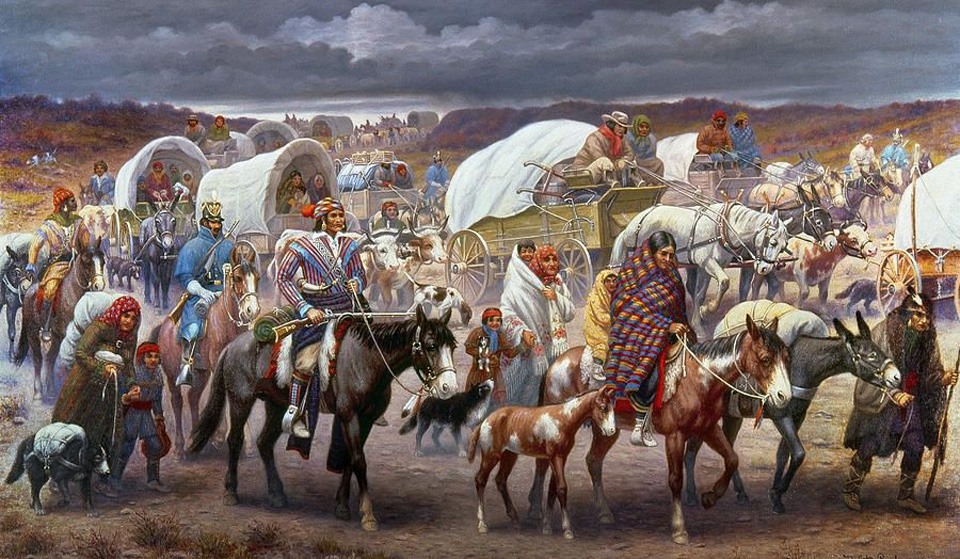
In this context, even the natives, the direct victims of the supremacist regime, are sometimes compelled to pin their hopes on the old guard and its most prized institutions, since they recognize what is arguably a more serious danger in the anti-elite settlers. The patterns of settler violence are different: while the established elite represents “respectable violence,” which becomes regulated through agreements with the natives, the new elite promotes the violence of the individual, the settler pushing further out west, whose ultimate symbol is the sheriff — the man who enforces “law and order” against the native’s resistance to colonization.
The path to Jewish Power
The analogy between the early 19th century United States and Israel in 2022 is by no means a perfect one. But it is difficult not to recognize many parallels.
One the one hand, Ben Gvir is a representative of a population group that was integral to the settler elite and has been able to enjoy the fruits of colonization: the religious-Zionist sector. In the “government of change,” this sector’s “respectable” stream was primarily represented in the Knesset by former Prime Minister Naftali Bennett, whose decision not to run in the election following the government’s collapse left a vacuum that Ben Gvir and his national-religious running mate, Bezalel Smotrich, were only too willing to fill.

But Ben Gvir’s popularity has also surged among disenfranchised, non-elite groups, as is evident from the increased voting rates for his party in the Negev, the “mixed cities,” and the predominantly Mizrahi cities of the south. These are the constituents he has enlisted in his campaign to remind non-Jews who are the “lords of the land” — particularly in the wake of the intercommunal violence of May 2021.
While Palestinians in Jerusalem were rising up against police brutality in the Old City and the settler takeover of the Sheikh Jarrah neighborhood, and amid another Israeli assault on Gaza, what became known as the “Unity Intifada” also saw violence break out between Jews and Palestinians in “mixed cities” on a scale that had not been witnessed since 1948. In Lod/Lydd, Ramle, Haifa, Akka, and Jaffa, rioters flooded the streets looking for people to lynch, leading to the deaths of two Jews and one Palestinian. Palestinians faced a mass arrest campaign while Jewish perpetrators, who were often backed up by police officers, received far more leniency from the Israeli authorities.
This intercommunal violence, whose Jewish victims were predominantly from marginalized populations, produced a swell of support for Ben Gvir’s “death to terrorists” rhetoric and proposals to expel “disloyal” Palestinian citizens. In the previous election of March 2021, Ben Gvir received just over five percent of the total vote; in this month’s round, he received close to 11 percent.
Ben Gvir also benefited greatly from a significant process that has been taking place among Haredi and traditional Mizrahi voters since the death of Sephardic Chief Rabbi and Shas’ spiritual leader, Rabbi Ovadia Yosef, in 2013. During his tenure, and despite making many racist and inflammatory remarks against non-Jewish Arabs, Ovadia was largely able to curb ultra-nationalism, and particularly Kahanism, as a political force among Shas’ voter base, even as the party committed itself to Netanyahu’s right-wing camp. Ovadia’s successor, Rabbi Meir Mazuz, who holds openly nationalist positions, has since enabled and validated Kahanism among those voters.
That Ben Gvir’s campaign slogan reeks of violence and supremacy should not allow us to forget that the “anyone but Bibi” bloc also views itself as the lords of the land. The previous government’s horrific record — which oversaw a sharp increase in deadly violence against Palestinians in the West Bank, the authorization of mass ethnic cleansing in Masafar Yatta, and the outlawing of six Palestinian human rights organizations — should be enough to remind us of the unceasing, ever-present violence of the old elite.
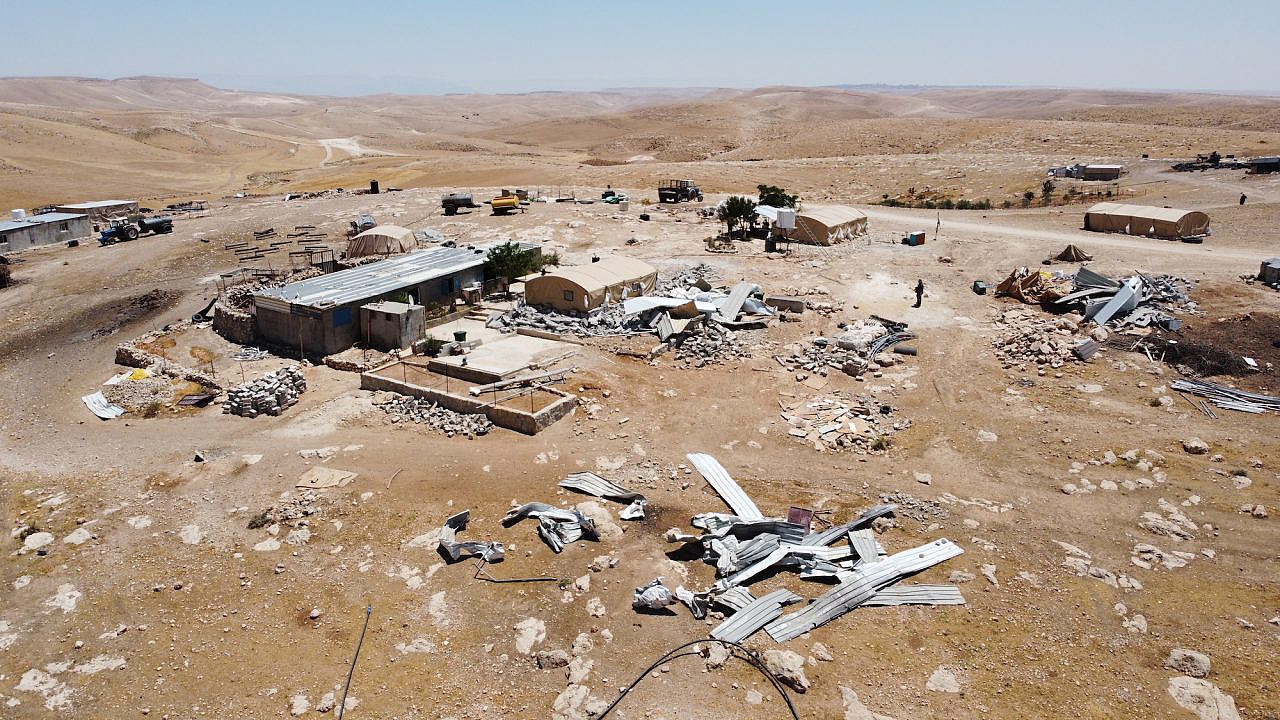
Still, the power of Ben Gvir’s slogan stems from the fact that it addresses precisely those members of the settler society who do not feel that they are the lords, and who have not enjoyed all of the fruits of Jewish supremacy, despite belonging to the powerful group. From here, the path to demanding “Jewish Power” is not a very long one.
In his attempt to portray areas like the Negev as regions bereft of meshilut, he has transformed them into a frontier, a Wild West, and himself into the sheriff who has come to bring order to the neighborhood, to protect the gains of the colony, rather than depend on the old establishment, whose aristocratic opulence has bred complacency. The sight of Ben Gvir pulling out his handgun in Sheikh Jarrah, a Palestinian neighborhood that has been at the center of his attention since it became a symbol of the Unity Intifada last year, only strengthens his portrayal of a sheriff bound by no law.
The answer? Decolonization
Those who are even slightly familiar with the massive police presence in the unrecognized Bedouin villages of the Naqab — a presence not intended to combat soaring crime, but to demolish Bedouin homes — know how laughable any claim about the lack of “policing” in the area really is. And yet, one must ask precisely how Ben Gvir’s sloganeering won him so much political power.
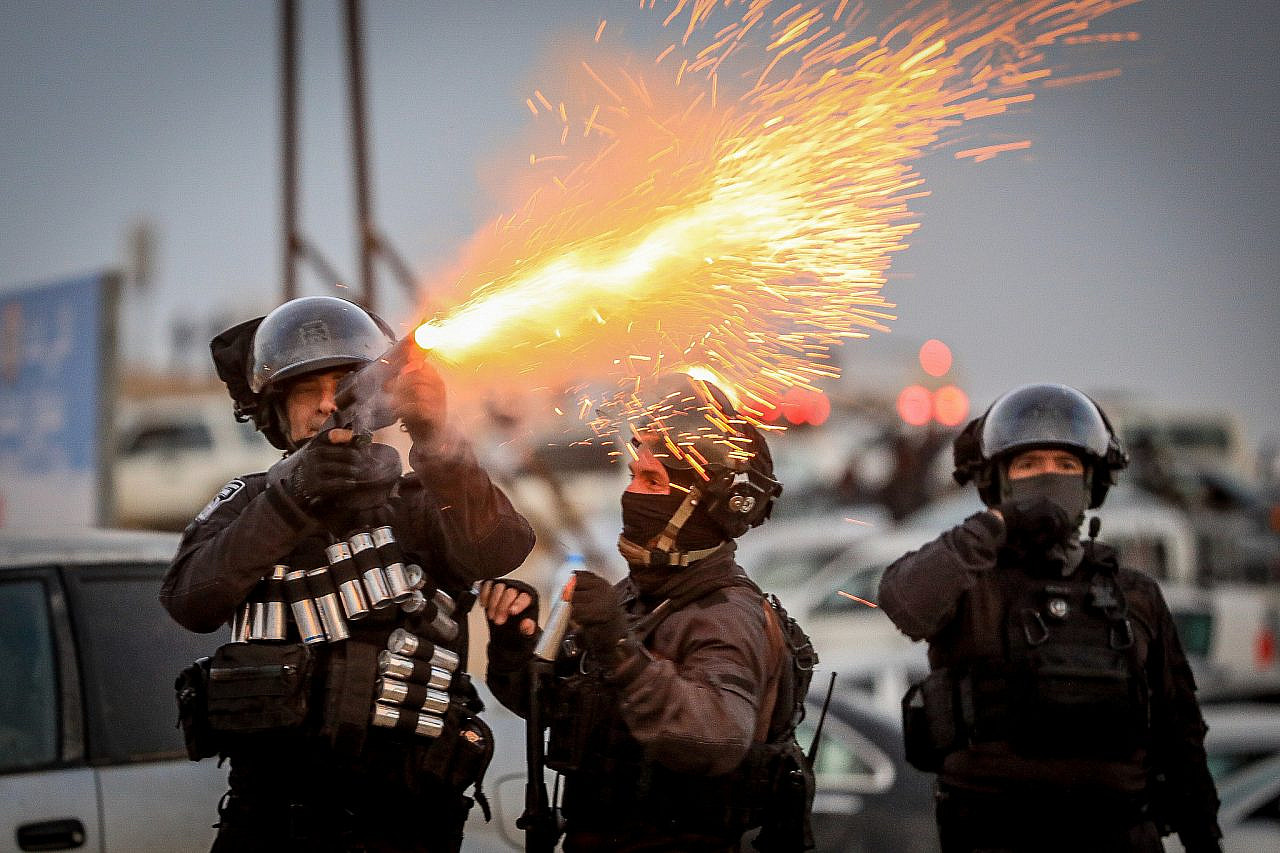
During the last year, which was a shmita (sabbatical) year in which planting trees is forbidden by Jewish law, Israel’s Chief Rabbinate permitted the transgression of shmita in cases where there was a need to “occupy lands.” This policy was manifested in plantations undertaken by the JNF in January, on the lands of the Bedouin village of Sa’wa al-Atrash. The non-violent resistance of local residents was framed in the Israeli media as violent and dangerous rampaging, and Ben Gvir was one of the first political leaders to arrive on the scene and demand meshilut.
When crime in Palestinian society — which affects Arab citizens first and foremost — begins affecting the Jewish public as well, the first to experience it will be members of the Jewish lower classes, and particularly small business owners, who are coerced into paying money to protection rackets run by Arab crime families in Israel’s southern cities. Ben Gvir’s ability to recognize the vulnerability of these Jewish Israelis, and to turn it into an issue upon which to campaign, is part of the secret to his success. According to him, any form of violent crime perpetrated by Palestinian citizens against Jews is akin to nationalist violence — terrorism — and the only proper response is through nationalist power, so that his supporters, too, will benefit from the fruits of Jewish supremacy.
As Orly Noy wrote on these pages, in the struggle between Sheriff Ben Gvir and the Israeli generals, as represented by Benny Gantz’s National Unity party, the sheriff won by representing the young and unbridled struggle against the established military elite. This supposed “democratization” seems almost inevitable, so long as it continues to take place within the clear boundaries of the colonial order.
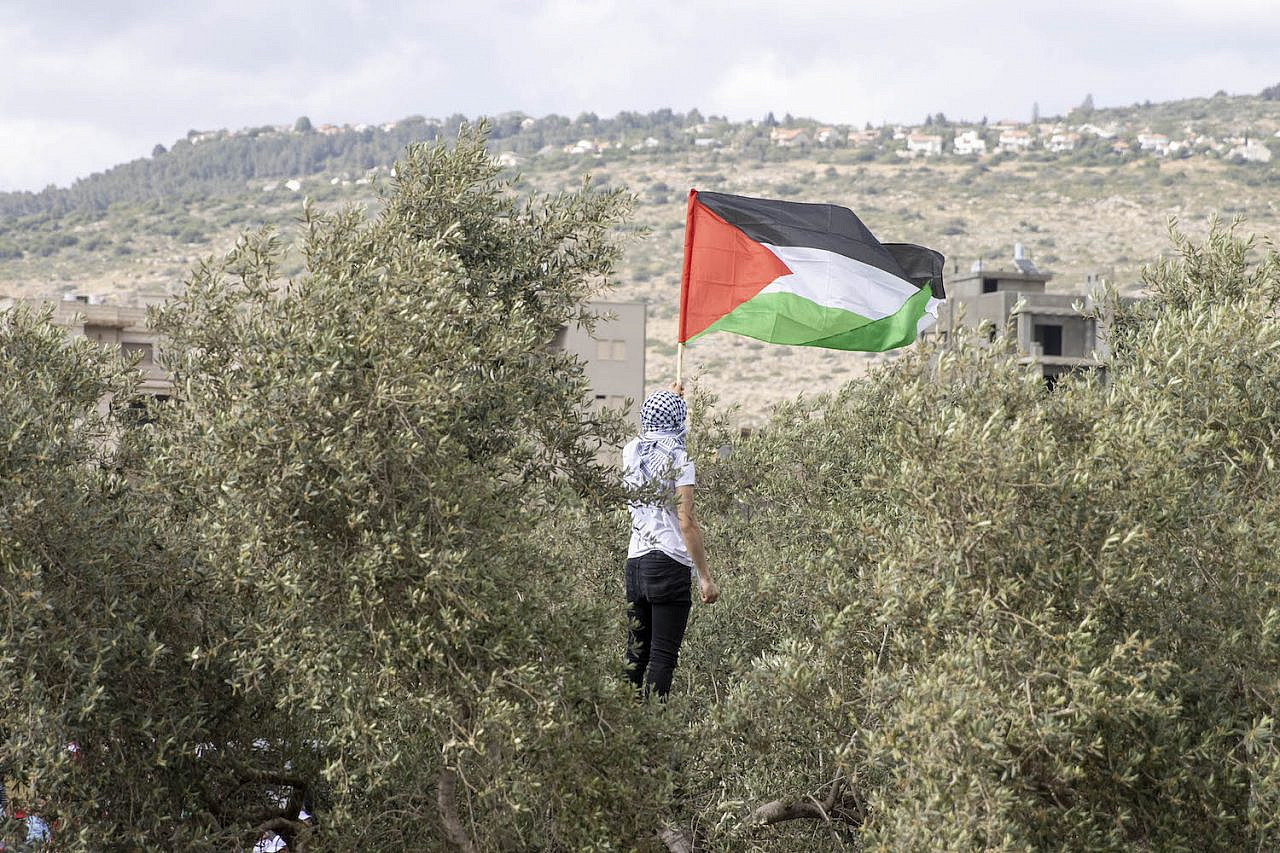
Substantial opposition to Ben Gvir, which goes beyond the respectability politics of a shocked Israeli bourgeoisie, can therefore only grow by putting forth a real political alternative to the framework he offers, which includes addressing the material and political needs of the people he now represents. Such an alternative can only stem from a clear call for decolonization between the river and the sea, and a sound rejection of the neoliberal economic order. That means unraveling the Gordian knot that connects, in Israeli settler imagination, the justified democratic claim for full participation in the political system with the colonial order of Jewish supremacy.
To do so will require us adopting a new political language: one that rejects the notion that justice can be sought through a more equal distribution of colonial spoils among the settler society, and instead seeks to dismantle the entire colonial order.

